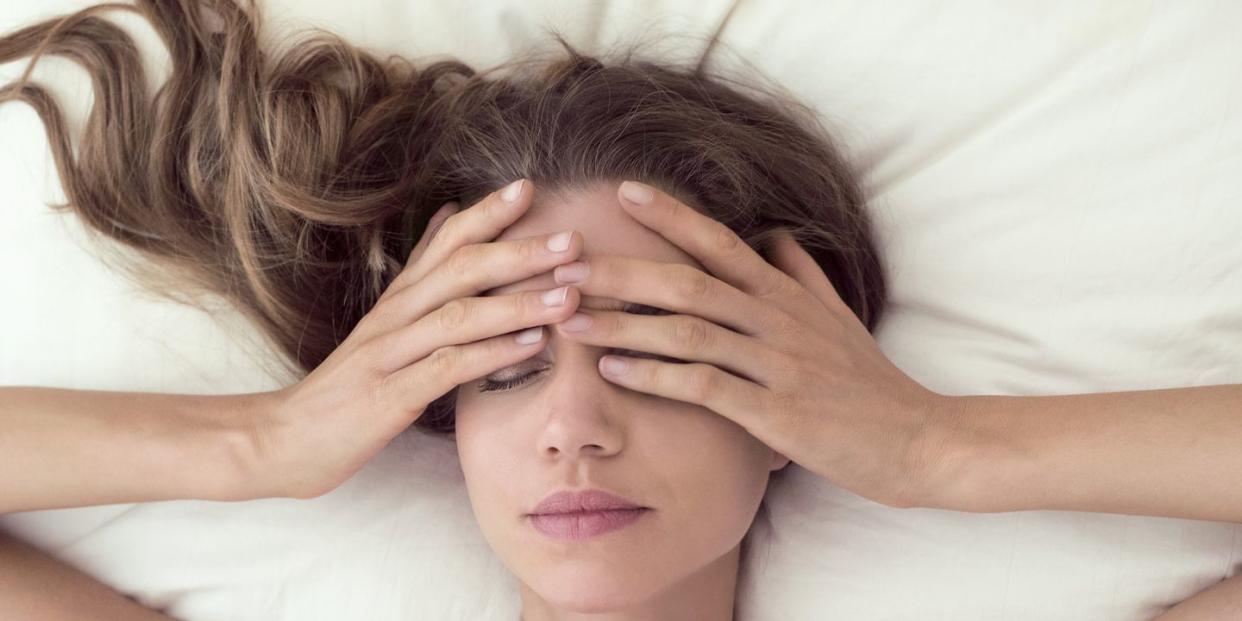8 surprising things that might be causing your headache

Wondering what's causing that headache? Headache triggers can include exercise, painkillers and even a weekend.
Whether it’s a niggling ouch or pain so agonising that you need to lie down in a darkened room, there’s a surprising list of headache causes worth knowing. We consulted the experts.
This article is for guidance only. If you’re concerned about your headaches, seek the advice of your GP, especially if symptoms are sudden or intense.
HEADACHE CAUSES: HITTING EXERCISE TOO HARD
Exercise is the best medicine for many things, including headaches, but it can also cause them. Exercise or exertion headaches are felt as a throbbing ache that can affect any part of the head.
"They’re caused by the release of chemicals called catecholamines," says Peter Goadsby, professor of neurology at King’s College London. "But we’re not sure why this causes headaches in some people and not others.’ If your GP has ruled out any underlying cause, they’re not dangerous.
"They’re common in people new to exercise, but don’t be put off," says headache specialist Professor Anne MacGregor. "Build up intensity slowly and ensure you're hydrated and have eaten before exercise."
HEADACHE CAUSES: FEELING CHILLED
It’s Saturday, you’ve had a hard week and as soon as you unwind, a migraine hits. A US study found that let-down headaches, as they’re commonly known, are caused by relaxing after a build-up of stress.
Researchers believe that the hormone cortisol, which is released during times of stress and reduces pain, may contribute to triggering a headache when you relax.
To stop stress building up, eat well, maintain regular sleep patterns and do frequent stress-busting exercises, such as yoga or running. Early studies also suggest that using probiotics could help people who have both intermittent and chronic migraines.

HEADACHE CAUSES: HAVING SEX
Yes, fun activities can also cause headaches. Sex headaches are most commonly felt as a dull ache at the back of the head that intensifies as you approach orgasm, or as an intense burst of pain at orgasm, known as a thunderclap headache.
"Pressure within the skull increases during sex and this can cause a slow-build headache in some people," says Dr Gerlis. "The thunderclap headache is thought to be caused by the sudden release of hormones at orgasm."
They’re not usually a cause for concern, but you should see your GP straight away if you experience one when you haven’t previously.
"Once any underlying causes are ruled out, we can look at helping the patient to manage the headaches so that they can enjoy sex," says Dr Gerlis. "Sex therapy can also help by teaching people new ways of enjoying sex, including taking a more passive role."
HEADACHE CAUSES: POPPING TOO MANY PILLS
The very thing that you’re taking to ease headaches could be to blame. Known as medication-overuse headaches, they’re extremely common.
"When you take occasional painkillers for a headache, they work with your body’s natural painkilling chemicals," says Professor MacGregor. "But once you start taking them regularly, the body starts to shut down its own production of these chemicals, thinking they’re not needed. You then start getting headaches more frequently, reach for the painkillers again, then experience withdrawal headaches when you haven’t taken them for a while, and so the cycle continues.
"If you’re taking any over-the-counter painkiller or triptan (prescribed for migraine) more than three or four times a week, see your GP,’ says Dr Gerlis. ‘With support, you need to stop taking the medication. The headaches will be worse initially, but will eventually lead to you being pain-free within weeks."
HEADACHE CAUSES: GRINDING YOUR TEETH
Do you ever wake up with a headache that’s just in front of your ear, perhaps with a sore jaw or temple pain? If so, you might be a nighttime teeth-grinder.
"Also known as bruxism, it’s very often a sign of daytime stress or anxiety," says Dr Laurence Gerlis, GP at samedaydoctor.org. It’s important to treat before it causes chronic pain.
"Muscle relaxants can stop bruxism ," says Dr Gerlis, "but you should also treat the daytime stress through holistic therapies such as counselling or yoga." Or ask your dentist about a nighttime mouthguard.
HEADACHE CAUSES: STAYING ANGRY
We all know that bottling up emotions isn’t good for us, but a study at St Louis University School of Medicine in the US showed that holding in anger is a particular headache risk.
If you struggle with managing anger, you could try cognitive behavioural therapy (visit babcp.com) or get in touch with the British Association of Anger Management (angermanage.co.uk), which offers courses in how to deal with anger healthily.
HEADACHE CAUSES: YOUR MORNING LATTE
Drink three to four cups of coffee a day? Then you should think about what time you have them.
"People usually have their morning coffee before work or as soon as they get there," says Peter Goadsby, Professor of Neurology at King’s College London.
"But weekend headaches are common because if you have a lie-in for a couple of hours, you’ll get a caffeine-withdrawal headache, sometime compounded by low blood sugar from a later breakfast." Try having your coffee, at the same time every day, especially in the morning.
HEADACHE CAUSES: SLUMPING AT YOUR DESK
Guilty of the desk hunch? "Most of us are," says Pilates guru, Lynne Robinson. "The classic rounded shoulders with your chin poking forward and neck compressed – it can easily lead to tension headaches because you’re shortening and tightening the muscles that are trying to support your head. In fact, any kind of bad posture, including a weak lower back, can radiate up the spine and cause headaches."
Long-term, Pilates is the perfect way to build a stronger, longer posture, but for instant relief from tightness in the upper back and neck, try shoulder drops, says Lynne.
Lie on your back, knees bent, feet flat on the floor. Have both arms raised above your shoulders, palms facing. Breathe in as you raise one arm towards the ceiling; the shoulder blade lifts. Breathe out as you drop the shoulder blade back down. Repeat up to 10 times each side to release tension.
You Might Also Like


